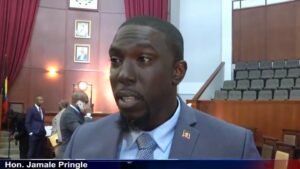Tanzania's Independent National Elections Commission disqualifies the main opposition party Chadema from the upcoming elections, following the arrest of its leader Tundu Lissu, who faces treason charges. As concerns escalate over political repression, the ruling CCM party's grip on power appears solidified.
Tanzania Bars Main Opposition Party from Elections Amid Escalating Political Tensions

Tanzania Bars Main Opposition Party from Elections Amid Escalating Political Tensions
The Tanzanian election landscape faces upheaval as the opposition Chadema party is disqualified, coinciding with treason charges against its leader, Tundu Lissu.
Tanzania's Independent National Elections Commission (INEC) has disqualified the main opposition party, Chadema, from participating in the upcoming elections due to the party's failure to sign a mandatory code of conduct document by the required deadline. This decision comes shortly after Chadema’s leader, Tundu Lissu, was arrested and charged with treason in association with a rally advocating electoral reforms in southern Tanzania.
Ramadhani Kailima, director of elections at INEC, confirmed that Chadema's disqualification includes limitations on taking part in by-elections until 2030. This move is seen as a significant setback for the party and is expected to bolster the ruling Chama Cha Mapinduzi (CCM) party's chances of maintaining its longstanding dominance in Tanzanian politics, where it has been in power for nearly sixty years.
Following her ascendancy in 2021 after the passing of John Magufuli, current President Samia Suluhu Hassan had received commendations for purportedly moving away from her predecessor's authoritarian practices. However, criticism has mounted against her administration for the perceived deterioration of political freedoms, which includes allegations of harassment and detainment of opposition figures. The government disputes these claims and has initiated probes into incidents of abduction involving opposition members.
Lissu, who was poised to challenge Hassan in the forthcoming elections, has vocally opposed the current electoral framework, insisting there cannot be genuine free elections without substantial reforms within the electoral commission, which he claims is arranged to favor the ruling party. He contends, "No Reforms, No Election," highlighting the need for comprehensive electoral changes that reflect a fairer political landscape.
Currently in custody and facing potential treason repercussions, Lissu's legal representation posits that the charges are politically motivated, indicative of an ongoing trend of government suppression. The case has garnered attention internationally, as Lissu’s previous political history includes overcoming an assassination attempt in 2017 and continued brushes with Tanzanian authorities.
As the political scenarios unfold with the general elections on the horizon, observers remain watchful of the implications these developments may have on the democratic landscape in Tanzania, especially regarding the civil liberties of opposition parties and their leaders.




















